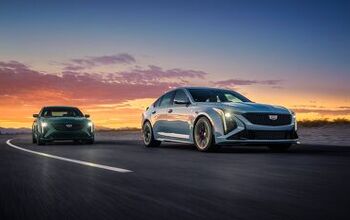As Hearings Loom, Toyota And Congress Gear Up For Battle
Toyota heads up to Capital Hill tomorrow to face the ire of the U.S. House Committee on Oversight and Government Reform in a hearing that’s been subtly named “Toyota Gas Pedals: Is the Public at Risk?” A memo by committee staff [via the WSJ] sets a paranoid tone for the hearing, as the NHTSA investigation widens beyond gas pedals alone:
Attention is now being focused on the electronic throttle control system (ETC) to determine whether sudden acceleration may be attributable to a software design problem or perhaps to electromagnetic interference. The committee staff found numerous complaints made to NHTSA describing sudden acceleration that was not caused by either floor mats or sticky pedals.
Toyota’s Yoshi Inaba will face the brunt of the questioning, although Transportation Secretary Ray LaHood and NHTSA administrator David Strickland will surely face questions about their oversight of Toyota (or lack thereof).
But Toyota and federal regulators aren’t the only folks being given an opportunity to testify before congress. Former NHTSA administrator Joan Claybrook and Sean Kane of Safety Research and Strategies, Inc have been added to the docket. And you won’t want to skip past their testimony either, as it promises to be some of the juiciest. A recent PBS Nightly Business Report interview with Claybrook reveals her to be an impassioned advocate of tougher auto industry regulation, and a skeptic about Toyota’s claim that electronic systems are not malfunctioning. Kane is likely to be an equally compelling witness, as his firm recently released a comprehensive report [full document in PDF format here] on Toyota’s ongoing unintended acceleration issues, which includes such nuggets as:
there is ample evidence to suggest that neither Toyota nor NHTSA have identified all of the causes of SUA in Toyota vehicles or all of the vehicles plagued by this problem. Of the 2,262 complaints, about half are from drivers of vehicles that haven’t been recalled. The complaint data also show that replacing a sticking pedal or the floor mat will not resolve the problem… absent a mechanical cause, the automaker and the regulators must look more closely at the vehicle control systems, including the electronic throttle control assembly and the associated sensors.
With Kane and SRS Inc’s report hitting the mainstream media, Toyota is tooling up for what promises to be a full-bore assault along these lines of attack. So it comes as no surprise to hear that Toyota has picked up some K-Street backup, hiring Glover Park Group, who Politico calls “arguably the best-connected Democratic lobbying-communications shop in the capital.” Toyota has also signed the Beltway “powerhouse” firm Quinn Gillespie & Associates to handle damage control.
Meanwhile, the NHTSA might want some PR assistance as well. California Republican Darrel Issa laid into the agency, taking aim at its apparent laxness under Bush administration leadership. “With unresolved complaints documenting incidents of unintended acceleration in Toyota model vehicles as early as 2003, I have serious concerns about the agency’s actions under the previous administration,” Issa said in a statement. Issa claims that documents from the NHTSA show a pattern of dismissing unintended acceleration concerns, reinforcing fears of revolving-door malfeasance at the NHTSA first aired in an ABC News investigation.
Ultimately, there seems to be plenty of circumstantial evidence that Toyota has not found a single cause for its unintended acceleration issue and that the NHTSA fared little better. But unintended acceleration is also a mysterious phenomenon, occurring at the intersection of of manufacturer defect and operator error. The likely result will be much congressional harumphing over an issue that might never be conclusively proven. All of which is bad for Toyota and good for competitors like state-owned General Motors and Chrysler. No wonder some are already calling this a “nationalist assault.” Tune in tomorrow for full coverage of the hearing.
More by Edward Niedermeyer
Latest Car Reviews
Read moreLatest Product Reviews
Read moreRecent Comments
- Ltcmgm78 It depends on whether or not the union is a help or a hindrance to the manufacturer and workers. A union isn't needed if the manufacturer takes care of its workers.
- Honda1 Unions were needed back in the early days, not needed know. There are plenty of rules and regulations and government agencies that keep companies in line. It's just a money grad and nothing more. Fain is a punk!
- 1995 SC If the necessary number of employees vote to unionize then yes, they should be unionized. That's how it works.
- Sobhuza Trooper That Dave Thomas fella sounds like the kind of twit who is oh-so-quick to tell us how easy and fun the bus is for any and all of your personal transportation needs. The time to get to and from the bus stop is never a concern. The time waiting for the bus is never a concern. The time waiting for a connection (if there is one) is never a concern. The weather is never a concern. Whatever you might be carrying or intend to purchase is never a concern. Nope, Boo Cars! Yeah Buses! Buses rule!Needless to say, these twits don't actual take the damn bus.
- MaintenanceCosts Nobody here seems to acknowledge that there are multiple use cases for cars.Some people spend all their time driving all over the country and need every mile and minute of time savings. ICE cars are better for them right now.Some people only drive locally and fly when they travel. For them, there's probably a range number that works, and they don't really need more. For the uses for which we use our EV, that would be around 150 miles. The other thing about a low range requirement is it can make 120V charging viable. If you don't drive more than an average of about 40 miles/day, you can probably get enough electrons through a wall outlet. We spent over two years charging our Bolt only through 120V, while our house was getting rebuilt, and never had an issue.Those are extremes. There are all sorts of use cases in between, which probably represent the majority of drivers. For some users, what's needed is more range. But I think for most users, what's needed is better charging. Retrofit apartment garages like Tim's with 240V outlets at every spot. Install more L3 chargers in supermarket parking lots and alongside gas stations. Make chargers that work like Tesla Superchargers as ubiquitous as gas stations, and EV charging will not be an issue for most users.































Comments
Join the conversation
Fact of the matter is Toyota doesn't yet know the real causes of the SUA in all of their vehicles. In essence Toyota is merely placating both their customers and the Feds with the recalls announced to date and at the same time trying to PR their way out of this mess. Since to date Toyota has done an absolutely miserable job on all fronts the fact that they don't know all the answers yet and are not disclosing that fact will surely come back to bite them. Toyota's actions or lack thereof across the board are their biggest problem, almost a textbook example of what not to do. Had they been upfront about the problem when it first started they'd be in a lot better shape today but they don't seem to be able to figure that out. There continued stonewalling while trying to put a positive spin on it will exact its toll.
Raked over the coals? On what planet? Everyone knows that the heads of GM, Ford and Chrysler got off easy. So did the heads of too many of our nation's banks. Some of them received golden parachutes and too many of them still have their jobs, and are even collecting bonuses. And as for the public rectal exam administered by Congressman Showboat or Seantor Grandstand, hey, that's why they make they make the big bucks. They can at least EARN their money. If they don't enjoy it, they should just fake it like any good prostitute. It's part of being a professional. It's called "acting." If nothing else, Toyota had shown they are quick learners, so I don't feel sorry for them as Congressperson Torquemada has his/her way with them.